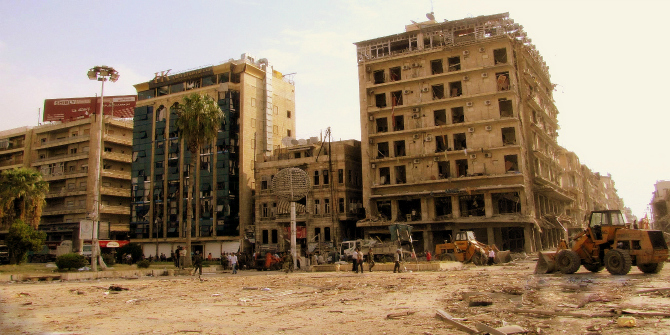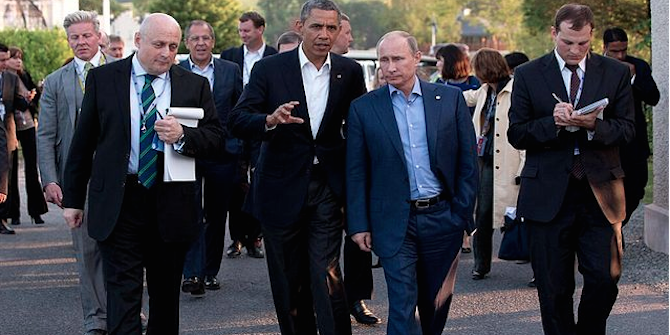Precarious Lives: Forced Labour, Exploitation and Asylum offers a groundbreaking examination of the forced labour experienced by migrants and asylum seekers seeking refuge in the United Kingdom. Hannah Lewis, Peter Dwyer, Stuart Hodkinson and Louise Waite explore the ‘hyper-precarity trap’ that binds their interviewees to exploitative, insecure and often hidden working conditions. Tribeni Gurung argues that this fascinating and comprehensible read not only powerfully highlights flaws in the UK immigration system, but also suggests ways to improve these structures.
Precarious Lives: Forced Labour, Exploitation and Asylum. Hannah Lewis, Peter Dwyer, Stuart Hodkinson and Louise Waite. Policy Press. 2015.
‘I’m illegal, instead of paying me £6.50 an hour, you know they are going to give me £3, then the cost of that shop, it’s come down. And that shop can give you cheaper food – that’s good for this society. That’s the slavery of this country.’
The disturbing words of a refused asylum seeker echo the hidden realm of modern-day slavery. Britain abolished slavery 200 years ago, but a ‘slavery industry’ remains active – an industry which is dirty, deceitful and desolate.
With attention currently on the European migration crisis, the book offers a prophetic narrative of what refugees and asylum seekers may face once they step on European soil. Such acts of forced labour in the Western world may seem rather farfetched, but the numerous dimensions of the stories presented in this book challenge the luxurious lifestyles and employment opportunities often associated with countries like the UK.
The book starts and ends well, with a focus on indebtedness as an umbrella for forced labour. The authors do an adequate job of scoping the literature in highlighting the political, historical and contemporary practices of modern-day slavery – a hidden subject which came to light in 2000 and 2004 with the death of Chinese migrants in Dover and Morecambe Bay respectively. The authors’ argument is split across three dimensions, which formulate the overall justifications for forced labour practices and what the authors describe as a ‘hyper-precarity trap’. The UK labour market has become more enigmatic and controversial than ever with zero-hour contracts and unpaid internships increasingly accepted as ‘normal’. This has facilitated insecure and flexible working practices in the UK employment industry, blurring the distinction between legal and illegal work.
Caught in this nucleus are asylum seekers and refugees who neither have the option to claim full employment rights whilst in the UK nor are able to return to their war-savaged, poverty-stricken home nations. They are victims in the working world and placed on the lower strata of the UK labour market. Adding to this, obstructions in their socio-legal status often prevent them from improving their situation. What is striking here is how the stories of refugees and asylum seekers reveal the rigid and sceptical nature of Britain’s legal system, especially when their own micro-level experiences initially hinder their life chances from an early stage of arrival in Europe.
 Image Credit: (zero.the.hero)
Image Credit: (zero.the.hero)
What I found particularly interesting was the exposure of power relations concerning employer-employee relationships throughout the book. Employers were one of the key players dictating every aspect of these vulnerable lives – from finances and work situations to internal feelings and emotions. With little control of their own lives, refugees and asylum seekers were not only forced to work in precarious situations, but also to live in a culture of dependency, often relying on their employers to prescribe their way of life. Employer-employee power relations were significant during the transatlantic slave trade: we are amply aware of the physical and brutal techniques used by employers towards their ‘employees’. Today, the slave trade is known as modern-day slavery, incorporating contemporary practices of exploitation; with it, employer-employee relations have also moved from dominating workers using physical techniques to those that are more psychological and emotional.
As a Researcher, I paid particular attention to the methods used for this research. The authors’ efforts to capture biographical accounts through encounters with 400 contacts are commendable, but what they do not provide is comprehensive detail of the methods they have used. What techniques were used to gain the trust of participants? How did the authors access agencies and organisations? What pitfalls did the authors face? At present, the process of collecting data seems all too smooth for an issue so delicate and fragile. However, their chosen method of interviews with research participants is valuable in that it reveals the numerous dimensions of forced labour amidst the baggage of being a victim of these practices.
Chapter Five may be a significant turning point in the book. After portraying research participants as victims of forced labour in the first half of the book, the authors recreate these subjects as heroic and empowered. They do this by using this section to demonstrate how unfree labour may be rejected using Cindi Katz’s (2004) definitions of reworking, resilience or resistance. For these refugees and asylum seekers, constant evaluation of their situation meant that attempts were always being made to alter their working conditions, such as pay and hours. This ongoing reworking of their context indicates a desire to improve their working lives even in the worst situations. Being resilient towards their situation and accepting their working life as a form of livelihood offers a sense of relief and mentality that their situation was not all that bad. Lastly, the final stage of empowerment was through resistance and taking the brave step of completely walking away from the situation. The absence of any portrayal of solidarity between workers in similar situations when exiting unfree labour illustrates the lone journey and solitary world of precarious work. It is a personal experience with peculiar qualities.
It is not all miraculous once one withdraws from the forced labour circle. The authors are quick to note that exit does not always lead to a positive outcome, since multiple consequences such as homelessness, deportation and earning money for remittance repeatedly lead research participants back to exploitative labour. The authors argue for an alternative definition of forced labour:
We argue that the concept of unfreedom is helpful in understanding the highly constrained choices and lack of alternatives that lead many asylum seekers and refugees to engage in severely exploitative work (155)
What makes this book truly unique is that it reveals the numerous dimensions and complexity of forced labour practices, usually overlooked in policy and academia. Descriptions of the UK political spectrum are intertwined and exposed through narratives, offering readers an underlying first-hand experience of forced labour. That said, Precarious Lives shouldn’t simply be used to highlight the flaws in the UK immigration system; rather, the book is compelling as a means to improve the system, especially in this globalised society.
Precarious Lives is therefore a valuable contribution to ongoing immigration debates, both within the social sciences and at policy level. The book also makes for a fascinating and comprehensible read for anyone interested in various forms of modern-day slavery.
Tribeni Gurung is a Researcher at The Salvation Army with a MSc. in Social Research Methods (2014) and a BSc. in Sociology (2012), both completed at LSE. Tribeni is writing in a personal capacity and the review does not represent the views of The Salvation Army as an organisation.
Note: This review gives the views of the author, and not the position of the LSE Review of Books blog, or of the London School of Economics.







